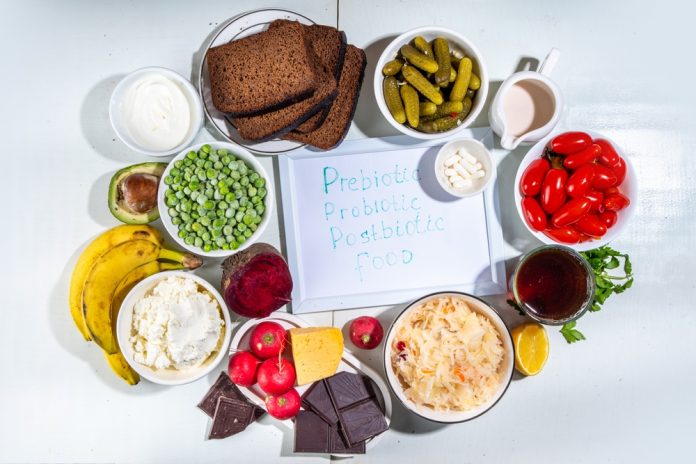I know about prebiotics and probiotics, but I recently heard the term postbiotics.
Today let’s learn about it.
Probiotics are living microorganisms found in certain foods like yogurt, sauerkraut and are crucial for good digestion and a healthy gut microbiome with a good balance of beneficial bacteria and microorganisms.
Prebiotics are essentially food for probiotics. Foods with healthy amounts of fibre like beans, whole grains and some vegetables break down in your body to create compounds that help probiotics to grow and thrive within your gut.
Sometimes, those microorganisms need help. Probiotics have been the go-to when it comes to your gut but there is a new influencer on the horizon– postbiotics.
So, what are postbiotics?
Postbiotics are essentially the by-products of our gut microbiota. Simply put, your body produces postbiotics after digesting prebiotic and probiotic foods, it’s what is left behind.
Healthy postbiotics include nutrients such as vitamins B and K, amino acids, short-chain fatty acids and substances called antimicrobial peptides that help to slow down the growth of harmful bacteria. These molecules are produced when good probiotic bacteria break down dietary fibre from foods such as fruits and vegetables, grains and legumes.
Postbiotic molecules are important for your gut microbiota, helping healthy gut bacteria thrive and flourish. Some postbiotics can even help suppress ‘bad’ bacteria.
Prebiotics are the food, probiotics are the microorganisms and bacteria themselves and postbiotics are the results of probiotics consuming the food.
Health benefits of postbiotics —
Although the concept of postbiotics is fairly new, they’ve been around for a long time and have several health benefits.
- Helps boost your immune system and reduce inflammation- Postbiotics have properties that help strengthen your immune system. They boost the production of T cells in your intestine which help control the magnitude of your body’s immune response. Postbiotics can also increase the production of anti-inflammatory chemical messengers called cytokines in the body which help reduce inflammation and promote immune responses. Studies in adults have found that postbiotics may help strengthen the immune system and protect against infections like the common cold.
- Helps reduce digestive issues- Inflammatory bowel disease (IBD), mild to moderate ulcerative colitis or Crohn’s disease are some major digestive issues that affect a lot of people. Postbiotics is known to play a role in regulating immunity and reducing inflammation in the digestive tract thus relieving digestive issues. Research also suggests postbiotics may help prevent and treat diarrhoea by reducing the number of “bad gut attacking” bacteria and increasing the number of “good warrior” bacteria. Good over evil always! Studies have found that supplementing with a postbiotic significantly reduced bowel motion frequency, bloating, and pain and improved their overall quality of life.
- Supports probiotics- Probiotics and postbiotics work together to benefit human health. Probiotics produce postbiotics which have been deemed beneficial for our overall health.
- Other potential benefits- Postbiotics have been associated with several other health benefits but more research is needed to understand the full extent of these benefits. It is said that postbiotics might help with allergies, may help manage blood sugar levels, may aid weight loss, may help lower the risk of heart disease and it might even have anti-tumor properties.
The down side of postbiotics —
It is important to note that not all postbiotics are heroes. We can’t have everything in life.
– One type of postbiotic is bile acids, which are produced when we eat too many high-fat foods. Staying on a high protein and low carbohydrate diet often means people who don’t eat enough fibre dont have good gut health in the long run. Bile acids have also been linked to inflammation and colon cancer
– If you’re taking a probiotic supplement to increase your production of postbiotics, you may experience digestive side effects like gas, bloating and stomach discomfort. However, these symptoms should disappear once your body adjusts to the supplements.
What should you eat to increase postbiotics in your gut?
Postbiotic supplements are not widely available because they’re relatively new discovery as compared to prebiotics and probiotics.
So au naturel is the way to go.
You can increase the number of postbiotics in your body by eating more prebiotic foods and probiotics, since postbiotics are their end products.
A plant-rich diet and dietary fibre is the key. It is said that women and men should consume at least 25 and 30 grams of fibre, respectively, daily. The best way to improve good postbiotics in your gut is to consume more vegetables, fruits, legumes, whole grains in the form of bread, nuts and seeds. Jerusalem artichokes, garlic, onion, leek and asparagus are fantastic prebiotic vegetables. Adding fermented foods like sauerkraut, tempeh, kefir and kimchi to your diet increases probiotics in your gut as well.
A diet rich in fruits and vegetables increases the levels of postbiotics like short-chain fatty acids in the gut and also helps reduce bile acids. Gradually change your diet. The best way to balance your microbiome is through a well-rounded diet.
In Conclusion —
It’s no secret that the human body is impressive. There are trillions of living microorganisms working tirelessly behind the scenes to keep you healthy. Gut health is all about diversity, which means eating a variety of fruits, vegetables, legumes and wholegrains to keep your gut healthy.
Postbiotics are considered safe and well-tolerated among most healthy people but it bears repeating that the benefits and effects of postbiotics need more research. There is much to learn about postbiotics but they are well on their way to being a household name.
Health disclaimer:
Before taking your gut health into your own hands through postbiotic supplements, talk to your doctor or nutritionist.
This article contains general information about health issues and is not medical advice. For medical and health advice, please consult your medical practitioner.








